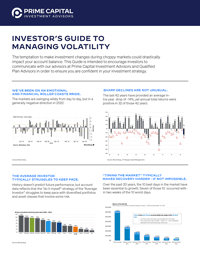Do you know what decisions you plan on making regarding your protected income in retirement? Seasoned financial advisors Jason Noble and Andy Merchant explore the foundations of protected income, specifically around Social Security and pensions, on their podcast, “20 Minutes of Clarity.” Let’s delve into some of the decisions involved in making the most out of these benefits!
Portfolio Reliance and Withdrawal Rate
When figuring out how you can optimize Social Security or a pension, you will want to understand portfolio reliance, essentially how much you are taking from the money you have invested to pay for your bills in retirement. Let’s say you need $10,000 a month to live the life you want to live and do the things you want to do. Well, if you have $5,000 coming in per month through protected income sources (such as Social Security or a pension) that means your portfolio reliance ratio is 50%. The lower you can get that reliance ratio percentage, the more likely you can have confidence in the longevity of your portfolio.
What is Social Security?
Social Security was established back in 1935 as a part of Franklin D. Roosevelt’s New Deal, a series of economic programs passed to rescue America from the throes of The Great Depression. Funded through payroll taxes, it’s designed to provide income for those who are disabled, retired, or the spouses of deceased workers. Social Security is a way we as a collective come together to take care of some of the most vulnerable members of our society.
As long as you’ve had a job you’ve been putting money into the Social Security fund. However, it’s important to remember that money goes to folks currently using the benefit, meaning it’s not saved for you. Once you qualify for SSI benefits, the money you will receive will be from the paychecks of Americans currently working. With more retirees pulling from the fund less workers to fund it, this is why we hear about Social Security being depleted by the mid-2030s unless we reform how it’s funded.
The Waiting Game of SSI Benefits
Sometimes with Social Security benefits it can be a waiting game, so you’ll want to know what time frames make the most sense for you to claim your benefits. These are some considerations to keep in mind when it comes to the waiting game:
- Early Claiming (Age 62): This may be advisable if the retiree has a low portfolio reliance ratio and needs to lower their withdrawal rate from investments. It’s also considered for those with pre-existing medical conditions or shorter life expectancies.
- Full Retirement Age (FRA) and Delaying Benefits: A retiree is entitled to full benefits when they reach full retirement age (age 67 for those born after 1960). If a retiree decides to delay taking their benefits, their monthly benefit amount will continue to increase until they hit 70. The decision to delay should consider factors like spousal benefits and survivor benefits.
- Spousal Benefit Eligibility: If one spouse has a significantly higher income, the other spouse may be eligible for spousal benefits, which can be up to 50% of the higher earner’s benefit if claimed at FRA.
- Maximizing Survivor Benefits: If one spouse passes away, the survivor can receive either SSI or survivor benefits, whichever is higher. Remember, if you are part of a married couple, only one check will come after one spouse passes away. It’s important to consider this when planning when and how to file for benefits.
- Impact of Early Claiming on Spousal Benefits: Claiming early reduces the spousal benefit percentage.
- The higher-earning spouse may want to delay claiming their benefits to increase the future survivor benefit.
- The lower-earning spouse can claim their own benefit earlier if needed, allowing the higher earner’s benefit to grow.
Pension Tension
Pensions can add an additional layer to the conversation around protected income, but unfortunately few companies offer them anymore. For those that do, below highlights some of the critical choices involved in pension plans and the impact that they can have on retirement comfort.
- Lump Sum vs Payment Plans: Pensions can be offered in either a lump sum or as payments. Retirees need to decide whether to take a lump sum amount upfront or opt for pension payments that are distributed over time. Taking a lump sum provides immediate access to the full amount but requires careful management to ensure longevity. Meanwhile, choosing pension payments provides a steady income stream, but may result in lower total payments over time, especially if the retiree or their spouse passes away earlier than expected.
- Survivor Benefits: When a retiree opts for pension payments instead of a lump sum, they often have the choice to include survivor benefits. This choice ensures that the pension continues to provide income to the surviving spouse after the retiree’s death. Pension plans typically reduce the initial monthly benefit when survivor benefits are elected, but this varies depending on the specific terms of the pension plan and the percentage of the original benefit that the survivor will receive (full, partial, period certain).
- Period Certain: There is also the option for “period certain.” This option guarantees benefit payments for a specified number of years regardless of whether the retiree dies prior to the end of the benefit period.
Professional Guidance
Understanding the impact of Social Security and pension benefits on your retirement can be a daunting task. Whether you are trying to understand your annual pension notice, figure out how long you should wait before claiming SSI benefits, or calculate your benefits in light of ever-changing regulations— a financial advisor may be your best resource in navigating this landscape.
Want to learn how you can strategize your protected income? Give Jason Noble a call today at (843) 743-2926 to take the first step in designing a portfolio tailored to your financial goals! Dive into the conversation on SSI and pensions by watching the full episode “20 Minutes of Clarity” here!
Advisory products and services offered by Investment Adviser Representatives through Prime Capital Investment Advisors, LLC (“PCIA”), a federally registered investment adviser. PCIA: 6201 College Blvd., Suite#150, Overland Park, KS 66211. PCIA doing business as Prime Capital Financial | Wealth | Retirement | Wellness.
071524007 JG





